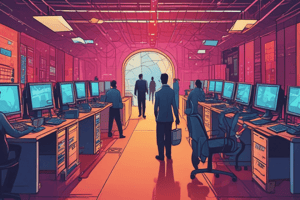Podcast
Questions and Answers
What was the primary reason for the Windows system crash on July 19, 2024?
What was the primary reason for the Windows system crash on July 19, 2024?
- A content configuration update was released. (correct)
- There was a cyber attack.
- A hardware failure happened.
- A power outage occurred.
Mac and Linux hosts were impacted by the Windows sensor update on July 19, 2024.
Mac and Linux hosts were impacted by the Windows sensor update on July 19, 2024.
False (B)
What time did the defect in the content update get reverted?
What time did the defect in the content update get reverted?
05:27 UTC
CrowdStrike's Sensor Content is part of a sensor release and is not dynamically updated from the _____.
CrowdStrike's Sensor Content is part of a sensor release and is not dynamically updated from the _____.
Match the following CrowdStrike update types with their characteristics:
Match the following CrowdStrike update types with their characteristics:
Which testing methods are included in the sensor release process?
Which testing methods are included in the sensor release process?
Template Types and Template Instances are the same thing.
Template Types and Template Instances are the same thing.
What is the primary purpose of Rapid Response Content?
What is the primary purpose of Rapid Response Content?
Customers can choose to install the latest sensor release or one version older ('N-1') or two versions older ('N-2') through __________.
Customers can choose to install the latest sensor release or one version older ('N-1') or two versions older ('N-2') through __________.
Match the following terms with their definitions:
Match the following terms with their definitions:
Flashcards are hidden until you start studying
Study Notes
Incident Overview
- CrowdStrike released a preliminary Post Incident Review (PIR) following an operational event on July 19, 2024.
- A content configuration update for the Windows sensor was intended to enhance telemetry on new threat techniques.
- The update led to a Windows system crash affecting sensors version 7.11 and above between 04:09 UTC and 05:27 UTC.
- Mac and Linux systems were unaffected by this incident.
Update and Resolution
- The defective configuration update was reverted at 05:27 UTC on the same day.
- Systems that connected post-05:27 UTC or that did not connect during the incident window remained unaffected.
Understanding the Cause
- CrowdStrike provides security updates in two main categories: Sensor Content and Rapid Response Content.
- The incident specifically involved a Rapid Response Content update with an undetected error.
Sensor Content
- Sensor Content encompasses a variety of capabilities aimed at adversary response, embedded directly in the sensor release.
- Unlike Rapid Response Content, Sensor Content is not dynamically updated and requires a full sensor release.
- It contains AI models and is built with reusable coding for long-term threat detection.
- Extensive QA processes ensure reliability, including automated and manual testing prior to rollout.
Rapid Response Content
- Rapid Response Content is designed for real-time adaptation to evolving threats and performs behavioral pattern matching using an optimized engine.
- It consists of fields and values with specific configurations for Template Instances, which enable the observation, detection, or prevention of target behaviors.
- Template Types represent capabilities for the sensor, providing essential telemetry and detection functionalities.
Deployment Control
- Customers have autonomy over their deployment through Sensor Update Policies, allowing them to choose sensors' versions to install, either the latest or older versions.
- This gives organizations the flexibility to manage their security environments effectively while integrating updates as needed.
Studying That Suits You
Use AI to generate personalized quizzes and flashcards to suit your learning preferences.



